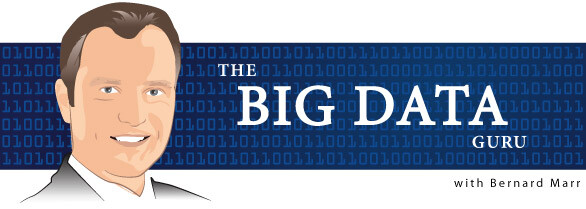
There are some things that are so big that they have implications for everyone, whether we want them to or not. Big Data is one of those concepts, and is completely transforming the way we do business and is impacting most other parts of our lives.
It’s such an important idea that everyone from your grandma to your CEO needs to have a basic understanding of what it is and why it’s important.

There are some things that are so big that they have implications for everyone, whether we want them to or not. Big Data is one of those concepts, and is completely transforming the way we do business and is impacting most other parts of our lives.
It’s such an important idea that everyone from your grandma to your CEO needs to have a basic understanding of what it is and why it’s important.
What is Big Data?
“Big Data” means different things to different people and there isn’t, and probably never will be, a commonly agreed upon definition out there. But the phenomenon is real and it is producing benefits in so many different areas, so it makes sense for all of us to have a working understanding of the concept.
So here’s my quick and dirty definition:
The basic idea behind the phrase ‘Big Data’ is that everything we do is increasingly leaving a digital trace (or data), which we (and others) can use and analyse. Big Data therefore refers to that data being collected and our ability to make use of it.
I don’t love the term “big data” for a lot of reasons, but it seems we’re stuck with it. It’s basically a ‘stupid’ term for a very real phenomenon – the datafication of our world and our increasing ability to analyze data in a way that was never possible before.
Of course, data collection itself isn’t new. We as humans have been collecting and storing data since as far back as 18,000 BCE. What’s new are the recent technological advances in chip and sensor technology, the Internet, cloud computing, and our ability to store and analyze data that have changed the quantity of data we can collect.
Things that have been a part of everyday life for decades — shopping, listening to music, taking pictures, talking on the phone — now happen more and more wholly or in part in the digital realm, and therefore leave a trail of data.
The other big change is in the kind of data we can analyze. It used to be that data fit neatly into tables and spreadsheets, things like sales figures and wholesale prices and the number of customers that came through the door.
Now data analysts can also look at “unstructured” data like photos, tweets, emails, voice recordings and sensor data to find patterns.
How is it being used?
As with any leap forward in innovation, the tool can be used for good or nefarious purposes. Some people are concerned about privacy, as more and more details of our lives are being recorded and analyzed by businesses, agencies, and governments every day. Those concerns are real and not to be taken lightly, and I believe that best practices, rules, and regulations will evolve alongside the technology to protect individuals.
But the benefits of big data are very real, and truly remarkable.
Most people have some idea that companies are using big data to better understand and target customers. Using big data, retailers can predict what products will sell, telecom companies can predict if and when a customer might switch carriers, and car insurance companies understand how well their customers actually drive.
It’s also used to optimize business processes. Retailers are able to optimize their stock levels based on what’s trending on social media, what people are searching for on the web, or even weather forecasts. Supply chains can be optimized so that delivery drivers use less gas and reach customers faster.
But big data goes way beyond shopping and consumerism. Big data analytics enable us to find new cures and better understand and predict the spread of diseases. Police forces use big data tools to catch criminals and even predict criminal activity and credit card companies use big data analytics it to detect fraudulent transactions. A number of cities are even using big data analytics with the aim of turning themselves into Smart Cities, where a bus would know to wait for a delayed train and where traffic signals predict traffic volumes and operate to minimize jams.
Why is it so important?
The biggest reason big data is important to everyone is that it’s a trend that’s only going to grow.
As the tools to collect and analyze the data become less and less expensive and more and more accessible, we will develop more and more uses for it — everything from smart yoga mats to better healthcare tools and a more effective police force.
And, if you live in the modern world, it’s not something you can escape. Whether you’re all for the benefits big data can bring, or worried about Big Brother, it’s important to be aware of the phenomena and tuned in to how it’s affecting your daily life.
What are your biggest questions about big data? I’d love to hear them in the comments below — and they may inspire future posts to address them.
Data: Using Smart Big Data, Analytics and Metrics To Make Better Decisions and Improve Performance
You can read a free sample chapter here.
For more, please check out my other posts in The Big Data Guru column and feel free to connect with me via:
Twitter, LinkedIn, Facebook, Slideshare and The Advanced Performance Institute.

